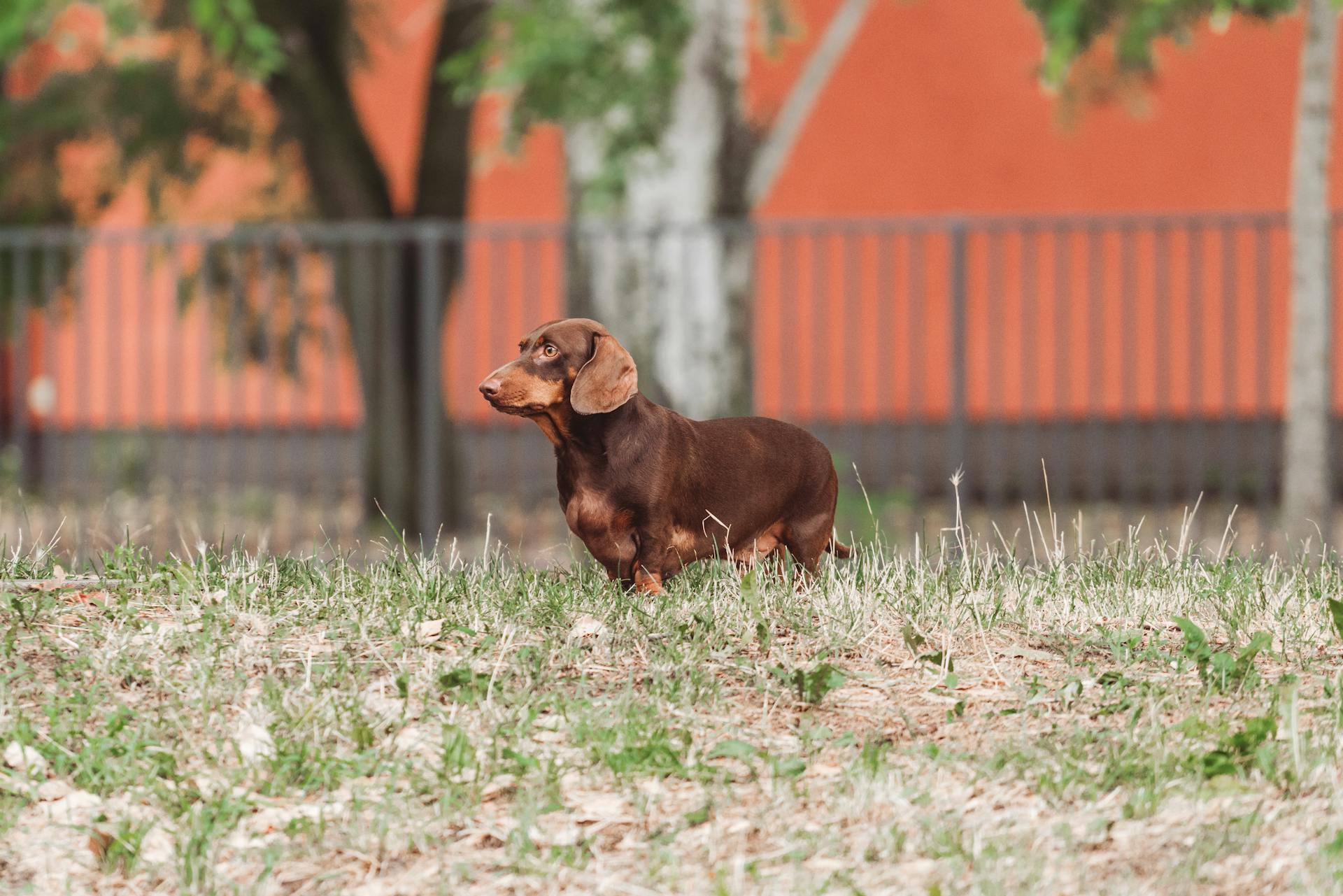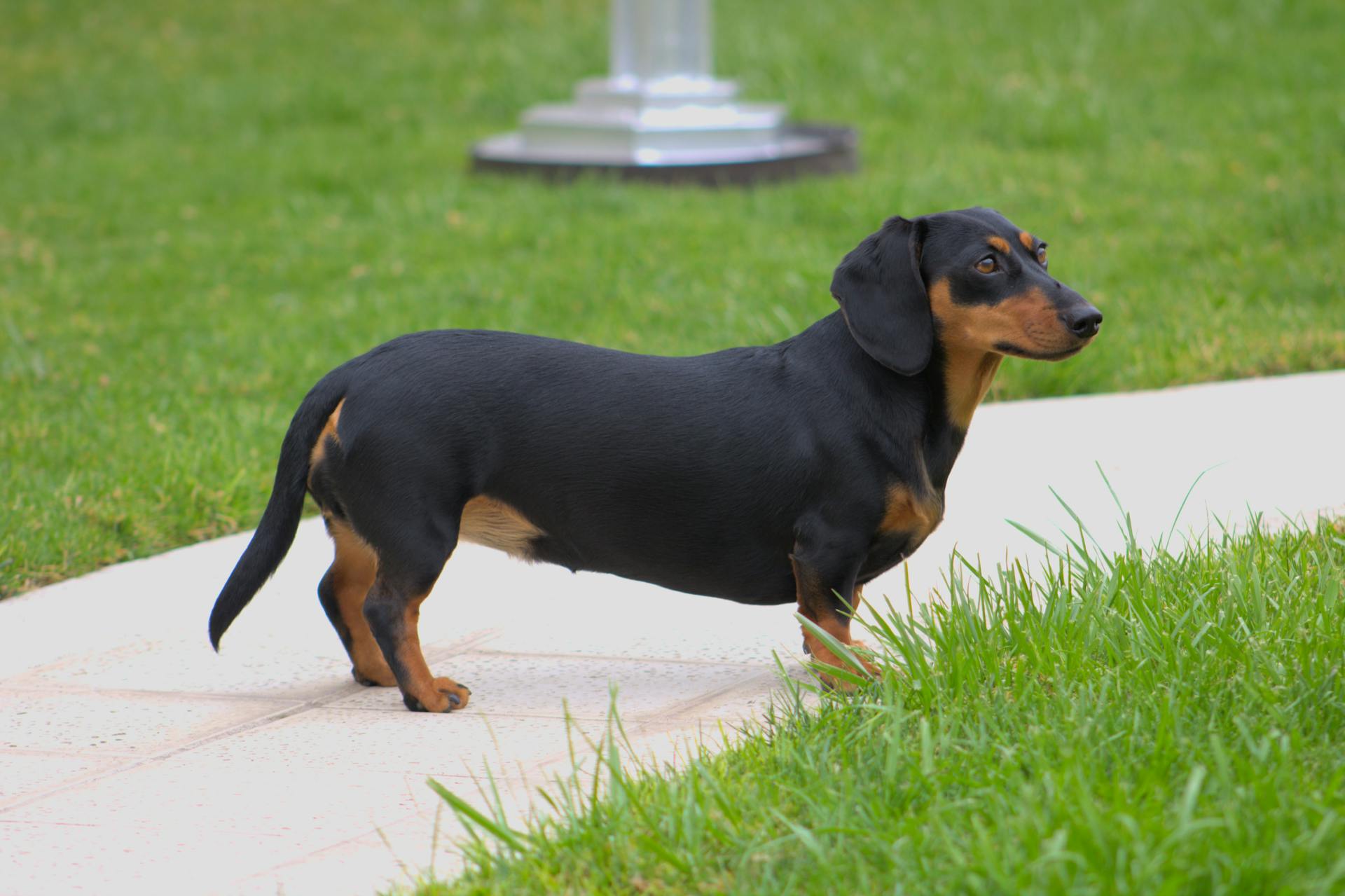
If you're considering bringing a Wiener Dog into your life, you're in for a treat. These little dogs have big hearts and are known for their playful, curious nature.
Wiener Dogs, also known as Dachshunds, are relatively small in size, typically weighing between 16 and 32 pounds. Their short stature and long bodies make them a unique and lovable breed.
Their short coats require minimal grooming, but they do need regular nail trimming to prevent overgrowth.
Temperament & Intelligence
Dachshunds are a smart little dog with a mind of their own, bred to hunt badgers and work independently. They can be stubborn and don't always want to listen to their owners, but they're also playful, charming, and very affectionate.
One of the best ways to measure a dachshund's intelligence is to play games with them at home. Try placing three empty cups in front of them, with a treat under one, and see if they can find it. If they go directly to the correct cup, they have better absorbing information skills.
Dachshunds tend to bark a lot and make great watchdogs, but they do require effort to shape their behavior appropriately. With patience and training, the results are well worth it.
To assess their problem-solving skills, hide their favourite treat in a place you know they'll have a decent chance of finding it. The sooner they find it, the better problem-solving skills they have.
Here are two simple games to play with your dachshund to see how smart they are:
While dachshunds may not be the best at working and obedience intelligence, they excel at instinctive and adaptive intelligence. Their instinctive intelligence is based on their ability to sniff out, hunt, and capture prey, and their adaptive intelligence allows them to solve problems on their own and learn new things by themselves.
Health and Conditions
As a wiener dog owner, it's essential to be aware of the potential health issues that can affect your furry friend. Intervertebral disc disease (IVDD) is a common problem for Dachshunds, being 10–12 times more likely to suffer from it than other dog breeds.
IVDD can cause significant neurological problems in Dachshunds, depending on where the affected disc is located. For example, a herniated disc in the neck will cause weakness in all four limbs.
Dental disease and obesity are also common health issues in Dachshunds. Regular dental care and a balanced diet can help prevent these problems.
Some common health issues that Dachshunds are prone to include:
- Intervertebral disk disease (IVDD)
- Luxating patella
- Idiopathic epilepsy
Grooming
Grooming is a must for your wiener dog, as it not only keeps them looking great but also helps prevent health issues.
Dachshunds don't shed excessively, but longhaired pups need frequent brushing to prevent mats and tangles.
A smooth-coated Dachshund needs only a quick weekly session with a bristle brush or grooming glove to stay looking their best.
Wirehaired Dachshunds, on the other hand, require hand-stripping a few times per year, as well as weekly brushing and sometimes a quick trim.
Bathe your Dachshund as needed, and trim their nails about once a month, depending on how much they wear them down.
Preventative dental care is also crucial, so be sure to brush your dog's teeth regularly or use products like dental chews, water additives, or a special diet.
You might like: Grooming a Nervous Dog
Exercise and Diet
Dachshunds are energetic dogs that need daily exercise to keep them mentally stimulated, control their weight, strengthen their muscles, and minimize the risk of back problems.
A 2025 study showed that two daily walks of at least 30 minutes have a positive impact on decreasing the likelihood of suffering from intervertebral disc disease.
Dachshunds should also have the chance to exercise their brains each day with interactive and puzzle toys to provide regular mental stimulation.
It's essential to keep an eye on your Dachshund's weight, as they can be prone to getting overweight, which puts extra strain on their long back and can lead to spinal problems.
Worth a look: Dachshunds and Back Problems
Exercise
Exercise is crucial for Dachshunds, and daily walks are a must to keep them mentally stimulated and physically healthy.
A 2025 study found that two daily walks of at least 30 minutes can help decrease the likelihood of intervertebral disc disease in Dachshunds.
Dachshunds need regular exercise to control their weight, strengthen their muscles, and minimize back problems.
Dogs that are not allowed to jump on and off furniture at home are more likely to suffer from disc problems.
Interactive and puzzle toys can provide regular mental stimulation for your Dachshund.
For more insights, see: How Much Exercise Do Dachshunds Need
Food & Diet

When choosing a diet for your Dachshund, it's essential to select a complete and balanced dog food from a reputable brand that meets their nutritional needs.
Dachshunds can thrive on small-breed dry food due to the reduced size of the kibble.
You may also consider feeding your Dachshund canned or wet food, or even fresh food delivered to your doorstep.
However, Dachshunds can be prone to getting overweight, which puts extra strain on their long back and increases the risk of spinal problems.
To avoid this, ask your vet to help you calculate how much your dog should be eating each day and stick to that amount.
Pet Compatibility and Essentials
Dachshunds tend to be good with other dogs, but their bold and protective personalities can lead them to clash with other dogs if not properly socialized.
Socialization is key, especially if you're considering getting a Dachshund companion. They can enjoy having a dog companion if done right, but it's essential to supervise their interactions to prevent any harm.
Dachshunds were bred to hunt small animals, so they may chase cats if not introduced properly. Early socialization and pairing the dog with a cat who's comfortable with canine friends can help mitigate this tendency.
For another approach, see: Companion Dachshunds
Puppies
Puppies are generally cute, but baby Dachshunds are especially adorable.
Dachshunds are among the 10 most popular breeds, making it easy to find a puppy if you're looking.
If you choose to buy a Dachshund puppy, be careful to research and screen breeders carefully to avoid unethical breeding operations.
Look for breeders who prioritize the well-being of their dogs and are transparent about answering questions and offer health guarantees.
You can also adopt a Dachshund dog from breed-specific rescue groups in your area or check animal shelters and humane societies.
Purebred dogs get adopted more quickly, so you might need to be patient if you want to rescue a Dachshund.
Once your Dachshund puppy comes home, it's time to start socializing and training them - don't let the cute puppy face fool you, they will take over the house if given the chance.
For another approach, see: Wire Hair Dachshund Puppy
Pet Compatibility
Dachshunds tend to be good with other dogs, but their bold and protective personalities can lead them to clash with other dogs.
However, if properly socialized and supervised, Dachshunds can enjoy having a dog companion.
Dachshunds may chase cats because they were bred to hunt small animals.
Early socialization and pairing a dog with a cat who's comfortable with canine friends can help with this tendency.
Keep birds and small exotic pets separated from Dachshunds to avoid predator stress or worse.
Some Dachshund owners have successfully introduced their pets to other small animals, like rabbits and guinea pigs, with careful supervision and training.
Discover more: Dog Biscuits for Small Dogs
Owning Essentials
Owning a Dachshund requires regular exercise to keep them healthy and happy. Dachshunds need at least 30 minutes of exercise per day, which can include short walks and playtime in the yard.
You'll also need to consider the importance of proper training for your Dachshund. If you're considering adding a Dachshund to your family, you might be curious about what it's like to live with and care for this breed.
Dachshunds are prone to obesity, so monitoring their food intake and ensuring they get enough physical activity is crucial.
Recommended read: Do Long Haired Dachshunds Need Haircuts
Measuring Intelligence
Dachshunds are smart little dogs that can be trained with the right approach. They have a mind of their own and can be stubborn at times, but with effort, their behavior can be shaped.
To assess your dachshund's intelligence, try playing two simple games at home. The first game involves placing three empty cups in front of your dog, hiding a treat under one of them, and distracting your dachshund before letting them find the treat. If they go directly to the cup with the treat, they have better absorbing information skills.
The second game is to hide your dachshund's favorite treat in a place they'll likely find it, and timing how quickly they locate it. The sooner they find it, the better problem-solving skills they have.
In fact, dachshunds shine in areas of instinctive and adaptive intelligence, which were left out of Coren's methodology. They were bred to hunt badgers, requiring them to work independently and make decisions quickly, which is a testament to their problem-solving skills.
Here's a comparison of the two games to help you understand your dachshund's intelligence:
Frequently Asked Questions
What is a wiener dog actually called?
A "wiener dog" is actually called a Dachshund, also known as a Dackel in modern Germany. This nickname likely originated from their long, narrow build resembling a sausage.
Is a wiener dog a good pet?
Yes, a Dachshund (wiener dog) can make a great pet for first-time owners, but they do require attention and social interaction to thrive. They're best suited for indoor living with their family, where they can receive the love and companionship they crave.
Are wiener dogs expensive?
Adopting or buying a Dachshund can cost between $150-$3,500 upfront, while monthly care expenses range from $155-$855+. Learn more about the costs and what to expect in our comprehensive guide.
Is a wiener dog a hot dog?
A wiener dog is actually a nickname for a dachshund, not a type of food. The term "wiener dog" refers to the breed's long, narrow body shape, not a culinary connection to hot dogs.
Sources
- https://www.dogster.com/dog-breeds/dachshund
- https://www.prettyfluffy.com/pet-lifestyle/health-wellbeing/are-dachshunds-smart-a-long-but-short-investigation
- https://sevneurology.com/blog/dachshund-health-issues-5-neurological-problems
- https://www.thewildest.com/dog-lifestyle/why-do-dachshunds-look-like-hot-dogs
- https://www.mentalfloss.com/article/63006/9-spunky-facts-about-dachshunds
Featured Images: pexels.com


